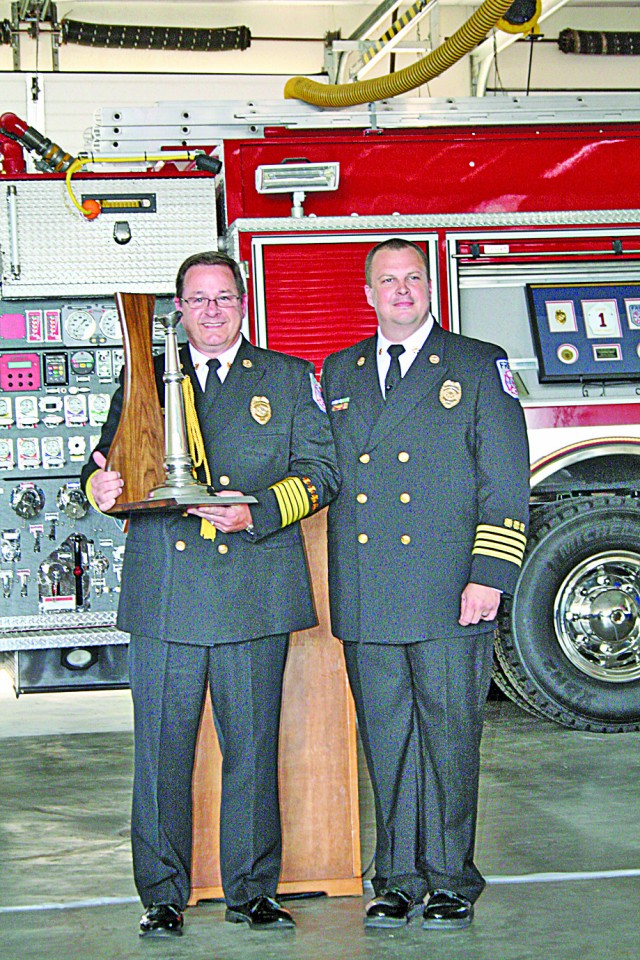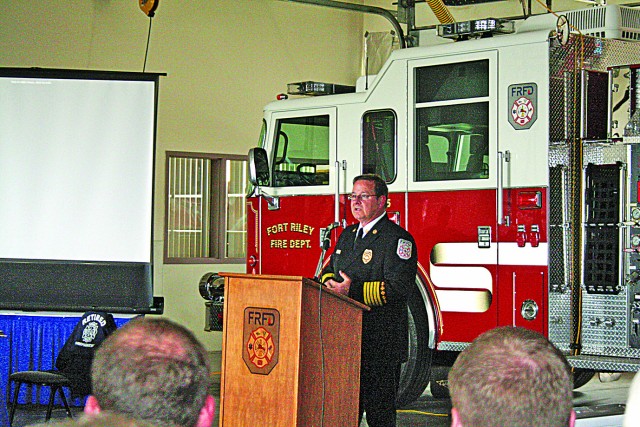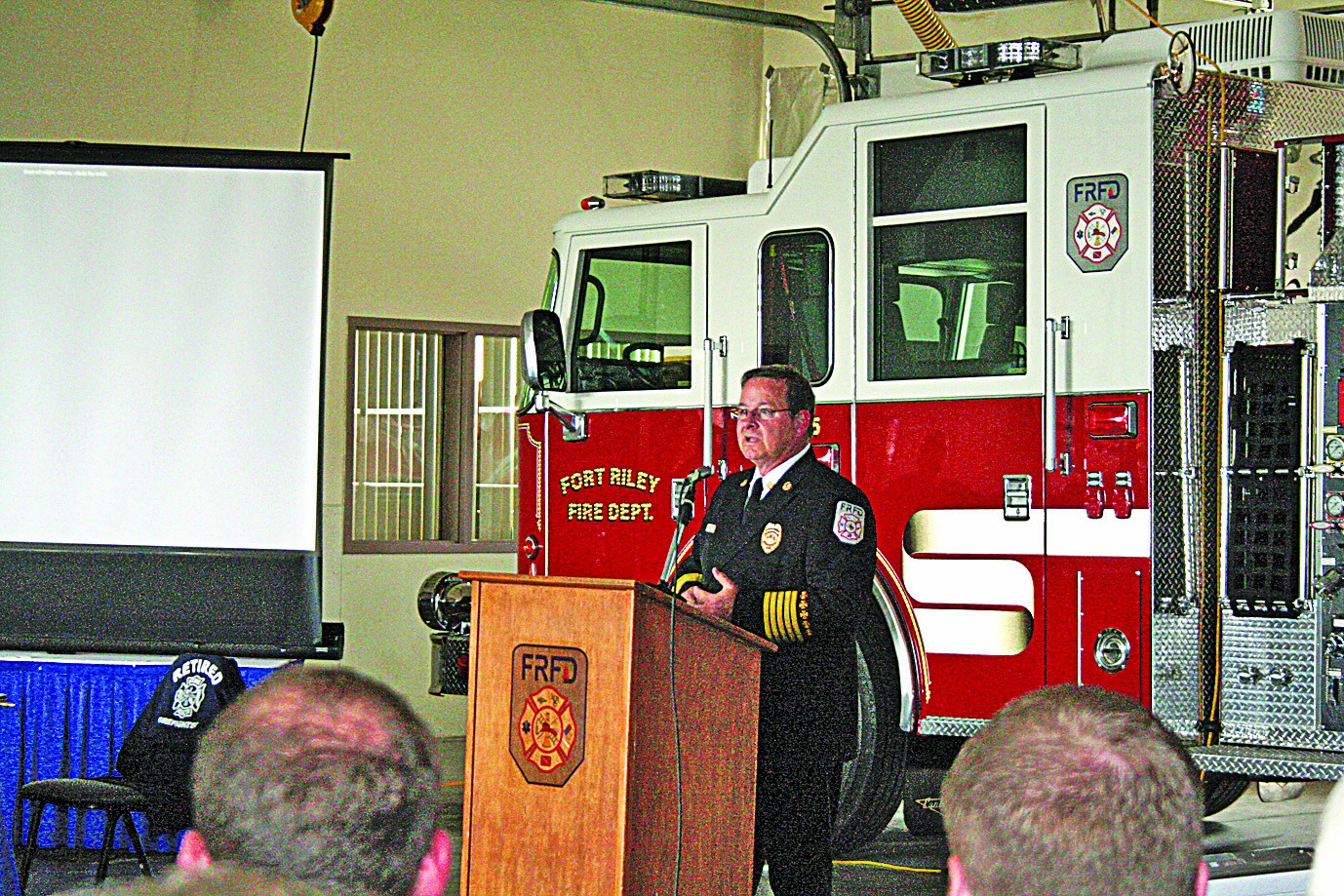FORT RILEY, Kan. - "Firefighting is something that gets in your blood and once it's there you thrive on the excitement of the job - not knowing what you're going to be doing five minutes from now," said Mike Cook, former chief, Fort Riley Fire Department. "A bell could go off now and lives change."
Cook retired June 3 after more than 29 years of service with the Fort Riley Fire Department and 33 total years of fire service.
"Chief Cook and I have worked together for almost 26 years," said Randy Freed, battalion chief. "We've watched each other grow from being spry young men to grumpy old men. I've learned a lot from Mike, and we had a lot of fun."
Cook began his career in 1977 as a volunteer firefighter on the Hope Rural Fire Department in Navarre, Kan., while also working at a grain elevator after graduating from Fort Hays State University with a major in business and minor in agriculture.
After being offered a position by his chief during a training exercise in Abilene, Kan.,
he was hired as a member of the Abilene Fire Department in October 1980.
During his tenure in Abilene he moved up the ranks from firefighter to driver-operator
and also became an emergency medical technician. When hired at the Fort
Riley Fire Department as a tailboard firefighter by retired Chief Richard Mathis on June
23, 1982, Cook was the only firefighter to also be an EMT.
"I'm living proof that you can go from a tailboard firefighter ... to now as fire chief where you have these nice air conditioned, fully enclosed, beautiful apparatus," Cook said.
As with any firefighter's career, Cook worked his way up the ranks beginning as a firefighter to driver-operator and lead firefighter to being promoted as assistant chief of the prevention branch and later moved to assistant chief of the fire operations branch before donning the title of chief on June 29, 2003.
At the beginning of Cook's career the fire department responded to fire-only calls. Now they respond to fire, medical, hazardous materials and rescue calls along with fighting wild land and aircraft fires. But firefighting was never Cook's first choice of careers. With his bachelor's degree in business and minor in agriculture, Cook had plans of working for Farmland Industries in their management program. That all changed after one night of firefighter training.
"(I) came home from training one night and told my wife I wanted to be a firefighter,"
Cook said. "She told me to go back to bed and sleep. The next morning I told her the same thing and then she got scared."
During his time at Fort Riley he has seen many changes in firefighting and in the department. Firefighters didn't have as many luxuries as they do now when Cook began his career.
"When I first started we were riding tailboard, now we have nice trucks; had no computers, everything was done pencil and paper, now the majority of my day is spent on the computer," Cook said. When asked by fellow firefighters when the last time he'd fought a fire was he replied, "I fight them every day at my desk. I just don't get the thrill of being able to put on the stuff and go inside buildings anymore."
The number of personnel on a single call also has changed throughout the years.
"We've gone from a time when we might have a total of five or six firefighters on a house fire to having the capability of putting four complete engine companies and additional safety personnel on a scene," Freed said. Life in the firehouse has changed for firefighters during Cook's tenure as well. "Some of the practical jokes and stupid stunts we pulled were frightening," Freed said. "If Chief Cook walked in and saw the firefighters today doing some of the crazy stuff we did back in our firefighter days, he'd probably have to fire 'em."
The department has gone from 35 to 70 firefighters which will soon increase with the addition of a fifth station in the Forsyth area. He also has seen the construction of a new station in the Camp Funston area, a new station built at Marshall Army Airfield and the first stages of construction on the new station going up in the Camp Forsyth area where his grandfather once worked. Cook recalled a story he and his grandfather, Charlie Cook, once shared about Camp Forsyth.
"He started telling me about him working in Camp Forsyth, building all of the barracks and administration buildings that were built down in that camp and how they set up a saw and how they brought all the wood in and how they custom cut everything and built all those buildings down there," Cook said.
The final step was to paint the building number signs and put "T" on the signs, which stood for temporary.
"He said while they were doing that they would be on the Infantry Parade Field, which is to the north of it, they would have their cannons lined up and they would be shooting into what was the impact area at that time which is now Custer Hill," Cook said.
Though the buildings were temporary, Cook found it interesting that his grandfather built the buildings he was currently burning down as training to make way for the new Forsyth housing area.
"He thought that was pretty ironic that he built them and I destroyed them, and now a new station's going on the Infantry Parade Field to protect all the new Family housing going in that area," Cook said.
He also has seen the addition of three new trucks. The most recent - arriving just in
time for his departure was the new pumper truck for the new station. Positions and branches also have grown since Cook's beginning, including the deputy fire chief and assistant chief of training positions and the growth of the fire prevention branch from one person to seven. Now with his retirement official he can continue on with his passion for teaching firefighters.
"Since firefighting's in my blood and has been for 33 years now, I could not really go cold turkey, so I'm basically going back to teaching, training and testing of firefighters," he said.
He has accepted a position with the Kansas Fire and Rescue Training Institute, part of the continuing education branch of the University of Kansas in Lawrence, Kan. He also plans to spend time with his wife of 33 years, Joni; two children, daughter, Jayme, 29, and son, Chris, 25; and granddaughter, Jaycee, 2. Cook was born and raised in Bellevue, Kan., east of Wamego, Kan., and graduated from Wamego High School. Cook also is the third generation to be employed at Fort Riley, his father, Jay Cook, worked for the Directorate of Engineering and Housing.
"When I think back about Chief Cook I'll remember the fun stuff we did, but I will also remember all the productive things I've learned from him," Freed said. "Working with him has been a blessing to me and he has been instrumental in guiding this department to the high standard it holds now."
Faces and names may have changed but Cook hopes no one really notices Deputy Chief Scott DeLay's transition to chief June 6.
"He's a good fit for the fire department," Cook said. "I think there will be very minimum transition between him and I, and that is my goal. It's always been my goal is to find a good fit for Fort Riley, minimum transition so that I could step out the door and they'll never miss a step. My parking space will be vacant, but this fire department will continue to run in the same way it always has. It's a great department; we've got great staff, great people working on the department; that I'll miss."




Social Sharing